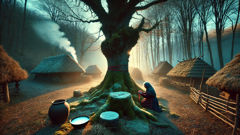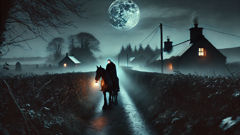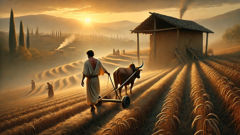Introduction
In the high hollows of the Carpathians, where columns of beech and oak gather like an old congregation, a legend coils through village fireplaces and the moss beneath travelers' feet. They call her Fata Pădurii, the Forest Maiden: a figure sketched in half-truths, half-silence, carried in lullabies and warnings in equal measure. To children she is a promise—strawberries left on roots, lost lambs led home by moonlight; to those who know the deeper ways she is an argument, a test of intentions. The elder women of the valley speak of her with a mixture of reverence and pragmatism: treat the wood with gratitude, leave a coin beneath the root of the old oak, do not take firewood without muttering thanks. Walk too loud, spill blood without respect, or break a spring's lip, and the same hands that braid wildflowers into crowns will set a thicket against your feet and weave illusions bright as broken glass. She is at once guardian and judge, as capricious as weather, as necessary as the river that cuts through rock. This tale traces a winter when the forest's mood was thinned by frost and rumor, when a young woodsman named Ion and a healer named Ilinca crossed the threshold into the Maiden's domain. Theirs is not a story of easy answers: it is a story that asks listeners to weigh kindness against consequence, to see the wild as neighbor rather than property. It is a song stitched from bark and breath, a caution told until dawn.
Roots and Offerings: Village Rites and the First Encounters
The valley had always been neighbor to the forest, not its owner. Houses pressed their backs to the slope and turned faces to the river; pastures folded into scrub and then into a dense world of trunks. In that boundary—where planks met moss and cultivated rows met the scatter of leaf litter—people paid attention. They knew the names of the trees as if kin: the broad-armed oak called Străbun, the whispering beech they named Voinic, the wayward rowan set aside as a marker of the crossroads. On the morning Ion first felt the weight of the Maiden's gaze, the village was keeping a small ritual for the autumn well. Elder Măriuca, who had a mouth like a dried fig and hands that read the weather better than any priest, tied red thread around a stone and placed a shallow bowl of milk beneath the leaning elder oak. "For the well, for safe water," she said, and then, when a child asked, added in a smaller voice, "and for the Maiden. She keeps what we ask of her and takes what we forget."

The practice was simple: a coin slipped into the roots, a song murmured near any spring, a handful of grain scattered at the entry to the wood. It was not meant to flatter a caprice but to acknowledge the dependence that the village had on the wild—wood and water, game and forage. Ilinca, who tended wounds and kept herbs in a cup of linen-scented cloth, taught these things to Ion, who was young and strong and foolish in the particular ways of men tasked with cutting wood. "When you take," she would say, "you must leave a word and a thing. The forest remembers every debt." Her hands were the kind that smoothed a fevered brow and braided rosemary into the hair of someone who had seen too much.
Ion did not always listen. He was the eldest son and spent many hours with his axe, measuring his worth in straight lines of felled sapling and the neat piles of dry wood he returned with to the village. He meant no sacrilege; he worked as his father had worked and his father's father before him. One day, deep in a part of the wood the villagers rarely trod, he cut a sapling because it obstructed a path he wished to widen. The tree was young, its heartwood pale and tender. As the trunk fell, there was a small, sharp sound that might have been a bird or might have been something more secretive: a ribbon of leaves trembling in a pattern that made Ion's skin feel like wind-barked bark. He shrugged and took the wood, but by that evening his fire would not keep—embers stung and dimmed as though someone breathed on them with cold hands. Dogs in neighboring houses whined at the dark edge of the wood. At the edge of sleep he dreamed of a woman with hair like moss and eyes like a spring, tracing a line on his palm with a finger colder than frost.
Rumors threaded the lanes. "The Maiden is displeased," someone said, and another voice answered with a laugh meant to thin the seriousness. Yet that laughter rattled. The first sign truly of change came in an unusual harvest of mushrooms: where Ion gathered his usual basket, he found only pale caps that exhaled a faint luminescence, and they tasted of ash when he tried to cook them. Ilinca took one bite, pursed her mouth, and set the rest aside. "Not all gifts are for us," she told him, and then walked the border alone at dusk, carrying a small bowl of cream and a coin.
It was on such a dusk that Ion met the Maiden properly. He had gone further into the wood than customary, drawn by an urge to clear a broader track for sleds destined to bring peat from a hollow. The sky had bruised purple and the understory glowed with soaked shadows. He heard a voice singing—not a human voice but a tune that gathered itself like dew on a spiderweb. When he turned, he saw her: standing beneath a leaning beech, she looked both younger and older than any measure of years. Her hair pooled around her like leaves; her skin caught the dying light so that she seemed stitched of luminous bark and river-water. She wore a wreath of rowan berries and thistle, and when she moved the air seemed to remember a long-forgotten path. For a moment the world contained only that small figure and the smell of wet earth.
"You take much," she said, and her voice was the rustle of pages. She named his axe and his father's name and the small scar he hid just above his ankle—the sort of knowing that men told one another over mead as proof of seeing a spirit. He answered clumsily, offering the practiced words his mother had taught: a coin, a pledge to pay back the forest for any harm. But his pledge was the thin garment of a man whose survival depended on timber. In the exchange he expected bargaining, perhaps a slight chastisement and then the return of normal nights. Instead, she laughed—not cruelly, but as rain laughs, inevitable and patient. "You will learn," she said, and then she vanished between trunks like fog sliding under a door.
Afterward the forest was different. Paths Ion had always taken changed subtly: a rock moved where the foot of a traveler had always landed, a favorite hunting hollow filled with a blanket of wildflowers he did not recognize. His neighbors spoke of similar small displacements—the hens that wandered at night to roost in bramble, the sudden blooming of a single pale rose beneath the eaves of houses that had not planted one. Some believed the Maiden was teaching manners. Others, more superstitious, whispered of a test. Ilinca, who understood both herbs and hearts, advised caution. "The forest is a ledger," she said, pouring tea into tiny cups under a lamp of honeyed beeswax. "It keeps what is paid and remembers what is withheld. A debt unpaid grows teeth."
As winter came, the stakes sharpened. Snow knifed the air and the forest seemed quieter, but not at rest—more like a living thing holding its breath. Supplies were thin, and the village depended on the wood Ion gathered. He hurried, driven by the tacit shame of having been bested by a thing he could not saw down. One morning a thin man from a remote farm arrived, breath puffing white, and told of a clutch of newborn lambs found at the forest's edge with their eyes shining oddly like moonlit ponds. "The Maiden watches us now like a hawk," he said, and his voice went small. The forest, people realized, had shifted from neighbor to other. Old bargains needed reexamining. New offerings were fashioned: bread shaped like hands, fences woven with a whisper of rowan, songs taught to children that spoke not only of fear but of the strange, reciprocal kindness found in respecting thresholds. The Maiden did not leave messages in simple terms; her lessons were woven, sometimes mercifully, sometimes painfully, into the lives of those who shared her wood.
Ion changed in ways that surprised his kin. He learned to listen: to the small sounds underfoot, to the cadence of a jay's call, to the way a stream's voice altered after snow. He began to leave not just coins but knitted scraps of cloth on roots, and he placed a carved wooden image—an offering that was neither luxury nor show—beneath the leaning elder oak. Ilinca watched this and allowed herself a narrow smile. "We are not always punished for our errors," she told him, "and we are not always rewarded for our care. The forest is not a ledger our way; it is older, and it has its own reason."
What remained constant was the Maiden's ambiguous mercy. Stories grew like lichens across years: a hunter lost who found his way by following a trail of luminous mushrooms, a woman whose child had been cold and fevered who woke to find the child wrapped in a blanket of moss and warm. Yet there were also nights when the wood took without return, when men who went in to fell oaks did not come back. Between those extremes the village learned to live—a life attentive to thresholds, an etiquette of the wild that honored leaving and asking and being seen. The Maiden taught them, then: the world does not owe you a favor because you have a right. It grants only what you have earned in humility and attention.
Trials and Transformations: The Woodsman's Reckoning and Communal Memory
The story's second winter arrived with an unusual hunger that stretched beyond grain and into the bones of people. It was not just the weather; rumor had hardened into a kind of pressure that made neighbors look over their shoulders into the black seam of trees. On the cusp of a month when the moon sat low and wide as a silver coin, Ion set out earlier than usual, his cart creaking behind him and his young apprentice boy shivering at his side. The obligation to keep fuel for the furnace, for the bread ovens and the roadside distillery on market day, pressed like an ache. He had not spoken of the Maiden much in the council; men prefer to talk of tools and measures, not of bargains tangled with moss. But at dawn, with frost painting the world in a thin glass, his steps were careful. He had learned to look: at the lichen's direction, the bent branch halfway up a trunk, the small hollows under roots that sometimes hid gifts or warnings.

They found a clearing Ion did not recognize, though he had walked these woods since childhood. At its center stood a stone older than memory—moss-swathed and carved with spirals like fingerprints of some slow god. Around it lay small trinkets: worn coins, a child's button, a strip of cloth embroidered with a faded name. It was clearly a place of offering. An animal had been there recently; the wheel marks at the edge of the clearing were too crisp for an old story. Ion felt the hairs on his arms rise. The cart's axle seemed louder than it ought. "Leave the wood," the apprentice whispered, and for the first time Ion felt the weight of the Maiden's presence pressing like the cold into his bones.
He did not leave. He told himself a thousand practical things: the village needs the wood; superstition will not warm ovens; the offering stone was not his concern. He approached the stone as if to measure it, and as his boot nearly touched the moss, he felt a hand—cool, damp, like the inside of a cave—rest against his forearm. He spun and caught only the ripple of air. The clearing folded like a page closed, and when he steadied himself the apprentice was gone. Panic rose hot and immediate. Ion's voice multiplied into echoes, calling a name he did not yet know. He ran deeper into the wood with the small flare of a desperate man.
The elder stories warn that the forest does not take lightly to panic. It will lead you until you are where it wants you—either to revelation or to ruin. Ion ran until his legs trembled and his breath came as quick as a trapped bird's. He called again and again, and finally, in the hush of a place where the trees arched like cathedral ribs, he found the boy. Not harmed, nor broken, but sitting calmly at the edge of a small pool that mirrored the sky. The hair of the apprentice was braided with a thin vine and his eyes looked as though he had seen something very old. "She sings," the boy said, and did not sound afraid.
Ion sat, feeling both foolish and furious. "Who sings?" he demanded. The boy's answer was simple: "The Maiden. She asked me to sit and to learn. She showed me the place where roots drink the moon. She taught me a song"—and then he hummed a melody Ion had never heard but which seemed to make the leaves lean slightly forward to listen.
For days afterwards Ion was at once relieved and unsettled. He had been saved from immediate loss, but a fissure existed between his knowledge and the wood's will. He began, with the stubbornness of someone who realizes he must change or perish, to undertake a penitence. He set aside his axe for three mornings to walk into the forest carrying only a bowl of milk and a small loaf. He practiced speaking to trees—not with mockery but with questions. He learned to ask: for permission to take a dry branch here, for permission to pass an old beech with its roots exposed there. Sometimes the forest answered by a small wind that arranged leaves in a circle at his feet. Once the Maiden touched his sleeve in a way that warmed him like a hearthstone and left the scent of crushed thyme.
The village watched this metamorphosis with a mix of skepticism and a gratitude that edged into superstition. They had always expected the brave to return as they were or be gone entirely; they seldom expected the brave to recede into listening. Yet Ion's change translated into practical survival: he learned to take only what the wood offered in abundance, to fell trees marked by a fungus that signaled an old cycle of life, and he taught others how to find deadwood that would feed ovens without unbalancing the forest. The result was a smaller, steadier harvest and fewer nights where fear stilled people's sleep.
But balance was not a single event. One spring, when the thaw came soft and a little wild, a woman from a distant hamlet arrived carrying a child with fever. She had heard whispers in market lanes—of a man who had learned to hear the forest's language, of a woman who kept ancient remedies. Ilinca and Ion were both present when the woman begged for help. The child was cold and burning by turns, and his eyes rolled as if watching another world. Ilinca moved with the surety of someone who has coaxed life back from the brink more times than she could count. She wrapped the boy in sheets steeped in elderflower and willow bark, and she and Ion walked at dawn to a spring that had recently gone silent.
At the spring's lip the Maiden awaited them. She did not appear as a heaven-sent specter but rather as a presence that had elected to show mercy in this moment: the steam of morning rose and in it a figure was formed. "Bring what you have offered honestly," she said, and Ilinca set down a small spoon of herbal salve. Ion, remembering every mistake, placed at the Maiden's feet a carved token shaped like an open hand. The Maiden looked at it as one might inspect a remedy's label, and then she knelt as if to touch the child—but instead she reached toward the spring and let her fingers linger in its water. The surface of the pool broke into concentric rings that carried a soft light. The child's breathing eased as if the spring had exhaled into him. He slept, and when he woke he had a clarity about him that was the mark of someone returned.
Word of the child's recovery spread until the valley itself became a living memory bank. Offerings layered at the spring accumulated into a shrine that was part gratitude and part necessity. But even as gratitude mounted, so did caution. The Maiden's gifts were precise and often came with terms not spelled out in human tongues. There were nights, once, when a man who boasted of having trapped a fox using a snare he had set without asking the wood's permission woke to find his hands blistered and burned as if he had held cold iron over a fire. Another time, a woman who took a basket of the herb known for calming childbirth without leaving anything in return dreamed of her infant wrapped in vines.
Through it all the Maiden's nature resisted simplification. Stories recorded both mercy and menace because such was the character of the wild. The villagers learned ritual that was both humble and exacting: songs that should be sung at dusk and known to children as their alphabet of boundaries, the leaving of bread and thread in specific patterns, the avoidance of certain slopes in spring when roots most needed shelter. They learned that the Maiden's favor could be coaxed but never owned. They learned also that she was not alone in the wood: there were other presences—small, slippering things that might trade a glimmering mushroom for a child's lost mitten, or a stooped woman with hair like thistles who could mend a broken midwife's tool with a stitch of twilight. The forest became, in memory and practice, a place of living reciprocity where even grinding need was tempered by the sense that every action had a counterweight.
Decades later, storytellers in the village still debated whether Ion had been chosen or punished, whether Ilinca had been a conduit to mercy or simply competent. The truth, as told by those who remembered and by those who inherited memory, was that the Maiden offered a mirror. She showed people the consequence of living as if the world were only a resource and then she offered the path by which that world might be rebalanced. It was not a fairy tale of tidy endings; it was the long pedagogy of a place that would not suffer impatience lightly. The lessons of those years shaped the village's laws and its songs, and when strangers came from afar seeking cures or omens, they found not a spirit to be dominated but a web to be respected. Those who listened, who learned to read a forest's small signals, found in the Fata Pădurii something like an ally. Those who marched in with the arrogance of entitlement sometimes left the valley with the memory of how little weight their will had when set against an ancient, breathing land.
Conclusion
The Fata Pădurii never became simply a comforting emblem nor did she fade into a singular terror. She remained, in the valley's memory, a force that asked people to change the way they saw the world: not as a ledger to be balanced solely with numbers but as a living network of exchange where silence and attention counted as currency. Her myths shaped practical laws: when to take wood, how to treat a spring, the songs that steadied children learning the difference between a path and a trespass. The Maiden's dual nature—bountiful and exacting—encouraged a kind of humility that proved itself both ethical and survivalist. People learned to sing the right things at dusk, to leave bread shaped like hands at roots, to speak politely to crossing herds. Those customs knitted communities tighter to their landscape so that, in lean years and flush ones, they could tend to each other and to the land on which they depended. Perhaps the lasting wisdom of the Fata Pădurii is simple: respect the worlds that feed you, listen to them, and remember that mercy is not owed but given and that every gift carries the possibility of a demand. In that reciprocity there is not only law but beauty—strange, luminous, and stubborn as a tree that refuses to fall. So the elders say as they sit by their hearths, and so the children are taught when they set a coin beneath an oak: live gently, ask clearly, and never forget to leave something of your own.













